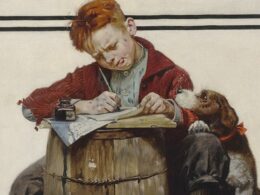Ambrose Bierce (1842–1914?)
From Ambrose Bierce: The Devil’s Dictionary, Tales, & Memoirs

Ambrose Bierce was born 178 years ago, on June 24, 1842.
When Bierce lived in London in the early 1870s, James Mortimer, his editor at the semi-weekly Figaro, often pretended to forget his name and called him, among other things, Abner, Abdelkader, Adolphus, and Abednego Goliath Bierce, Esq. (At least one biographer believes that Mortimer probably gave him the nickname that stuck: Bitter Bierce.) We don’t know what Bierce thought of this razzing, but compared to what appeared in Figaro, he seems to have got off easy. An American who fled France with the entourage of the deposed Napoleon III, Mortimer became notorious for the smears and vitriol published in the pages of the paper, and his theater reviews in particular led to libel cases and threats of duels.
At the London Figaro, Bierce honed his own technique of invective and mockery. And then Mortimer offered Bierce the opportunity of a lifetime: a high-paying position editing a well-funded magazine, or as Bierce described it, “a pizen [poison] of a thing of which I write every line.” Mortimer’s role was simply to suggest a few specific targets for Bierce to ridicule. The younger writer naively went along with it—not realizing that Mortimer was using him for a purpose that wasn’t revealed until after the second (and last) issue was published.
For this week’s Story of the Week selection, then, we present “Working for an Empress,” a surprisingly charming piece by Bitter Bierce—not that the story doesn’t contain a few good insults.



